This post may contain affiliate links. Please read my privacy policy.
Thai Red Curry is a must-try if you love an aromatic blend curry paste, creamy coconut milk, and just the right amount of heat. This authentic red curry recipe with chicken uses simple, store-bought ingredients and takes only 20 minutes from prep to dinner table.
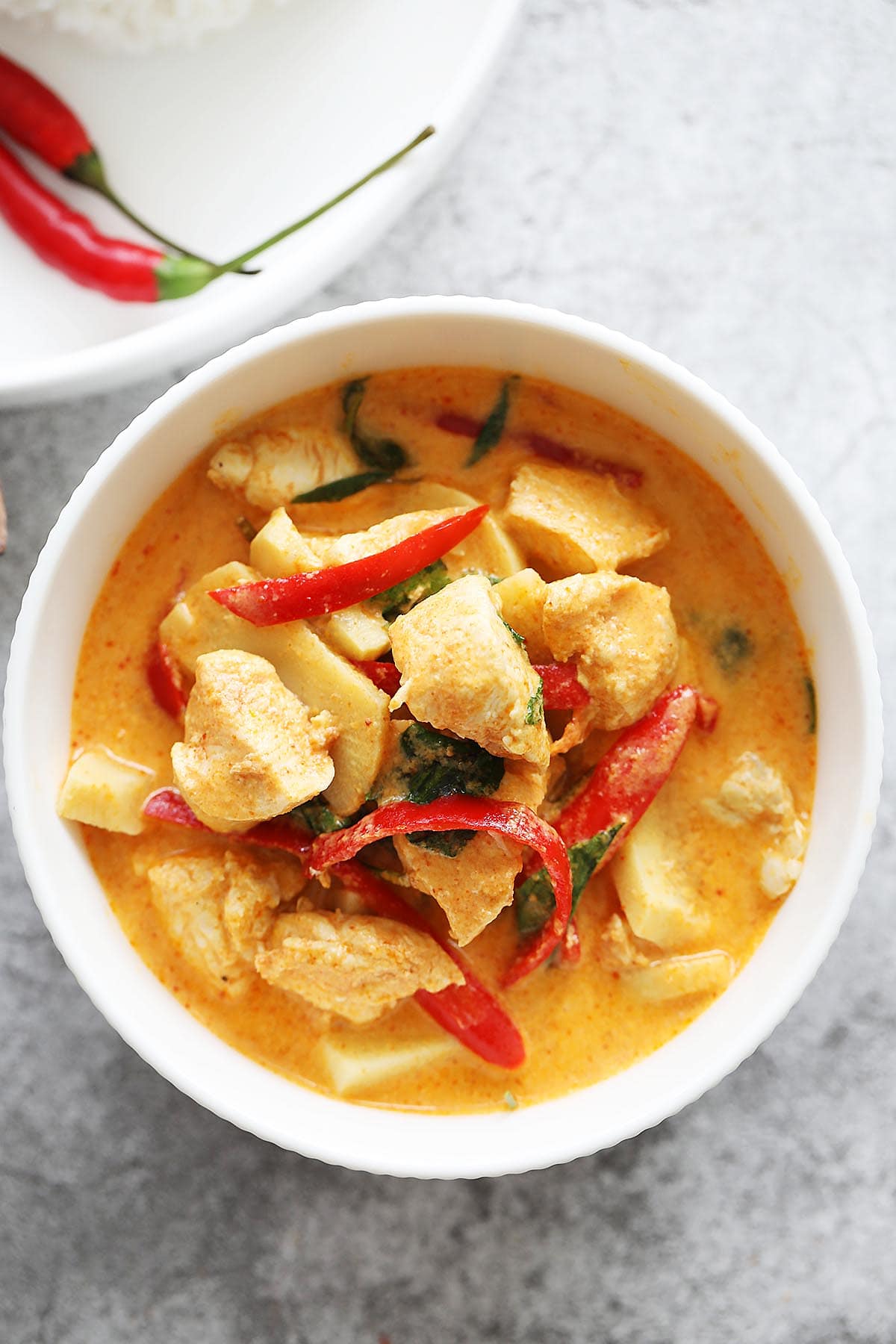
Thai red curry is my favorite Thai curry. The inviting red color is just the beginning—I absolutely love the rich taste and the blend of ingredients in the curry paste.
Common proteins for Thai red curry include chicken, beef, shrimp, pork, scallops, and mussels, or any combination of them. For example, if you’re a pescatarian, you can create a recipe with shrimp, scallops, and mussels. Regardless of the protein choice, each adds its own unique flavor to the rich, creamy, and utterly delicious sauce. It’s incredibly tasty when served with steamed rice.
Why You’ll Love Thai Curry
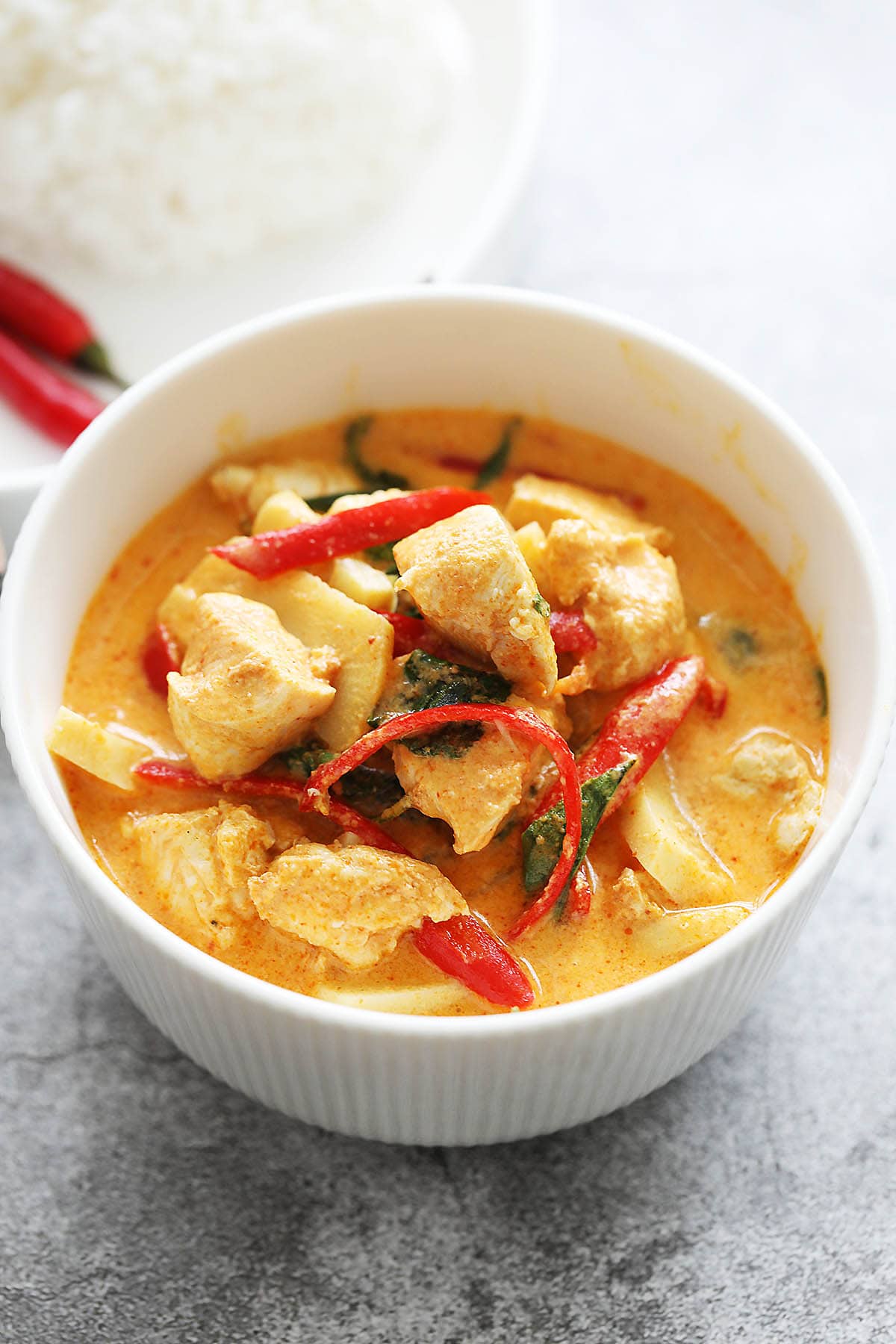
Thailand offers a range of curries; other than red curry recipe, there is Green Curry (herbal and spicy), Yellow Curry (mild and aromatic), Massaman Curry (rich and nutty), Panang Curry (creamy and mildly sweet), Pineapple Curry (tangy and creamy), Zucchini Curry (vibrant and comforting) and Jungle Curry (spicy and less creamy).
Each curry features distinct flavors and ingredients, showcasing the regional diversity of Thai cuisine. I love Thai curries for several reasons:
- Easy and Quick: You only need a small pot, and it takes less than 20 minutes from prep to dinner table.
- Accessible Ingredients: Store-bought curry paste is readily available, so you don’t have to go to specialized Asian food stores.
- Creamy and Delicious: The curry sauce combines spicy, sweet, salty, and sometimes sour flavors, making it perfect with steamed jasmine rice.
- Balanced Meal: Thai curries often include vegetables, making them a well-rounded meal. With just one dish, you get a complete and wholesome meal.
Thai Red Curry Recipe – Ingredients
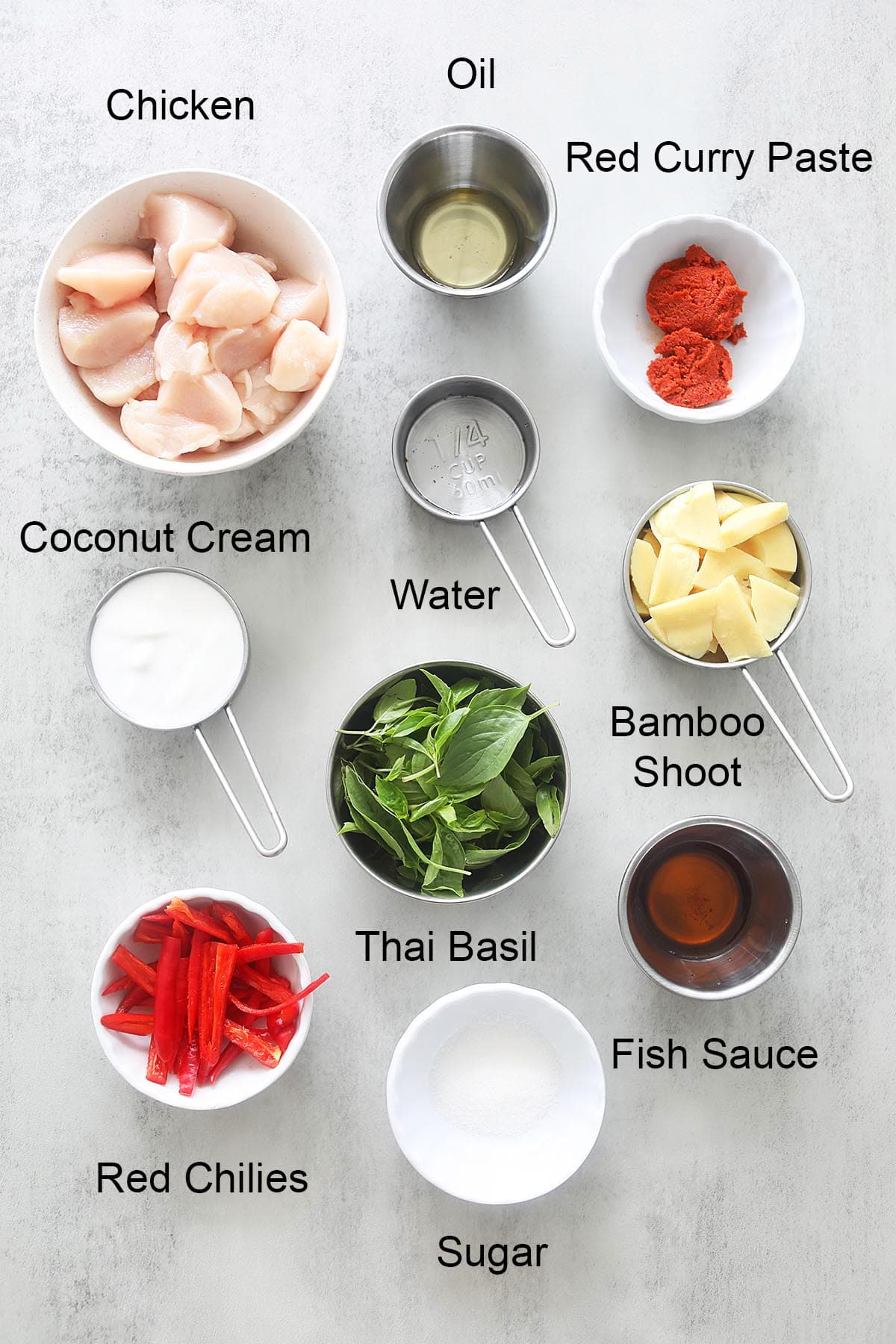
Making Thai food is easier than you think! You can find all the ingredients at Asian food stores or in the ethnic aisle of your regular supermarket.
- Chicken – You can use chicken breast, chicken thighs, or a combination of both. However, I prefer the meat to be skinless and boneless.
- Red Curry Paste – This is the most important ingredient in the recipe. In Thailand, freshly made red curry paste is available at local wet markets, but store-bought red curry paste is equally authentic and very accessible.
- Coconut Cream or Coconut Milk – I prefer using coconut cream for a richer and creamier curry. If you use coconut cream, you will need to add more water to the recipe.
- Bamboo Shoots – In Thailand, red curry typically includes vegetables like Thai eggplants, green or red bell peppers, baby corn, bamboo shoots, carrots, and green beans. For this red Thai curry, I opted for canned bamboo shoots. Be sure to buy sliced bamboo shoots instead of strips, or purchase whole bamboo shoots and slice them yourself.
- Red Chilies – I used a combination of red Thai chilies (spicy!) and regular red chilies. The Thai chilies add heat, while the regular red chilies contribute color and texture.
- Thai Basil – Also known as purple basil, it features purple stems and adds a slightly spicy, anise-like flavor, giving the curry a distinct aroma.
- Fish Sauce – Adds a salty and umami note to the curry.
- Sugar or Thai Palm Sugar – Red Thai curry chicken is traditionally sweetened with Thai palm sugar, but white or brown sugar works well in a home kitchen.
Sidenote: Thai eggplants are small, round, and typically green or purple, with a slightly bitter taste and firm texture that holds up well in curries. If you can find them, consider using Thai eggplants instead of bamboo shoots.
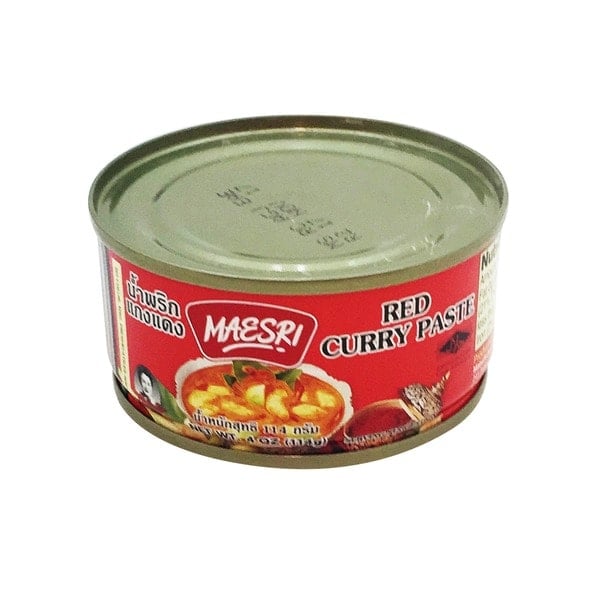
Shopping Tips: Red curry paste is typically available in small round cans or larger plastic tubs. I usually buy the small can unless you plan to make Thai curries regularly. Once opened, transfer any unused paste to a small airtight container and keep it in the fridge for up to a few weeks. I recommend the Maesri brand red curry paste, as pictured above.
Red Curry Vs. Green Curry
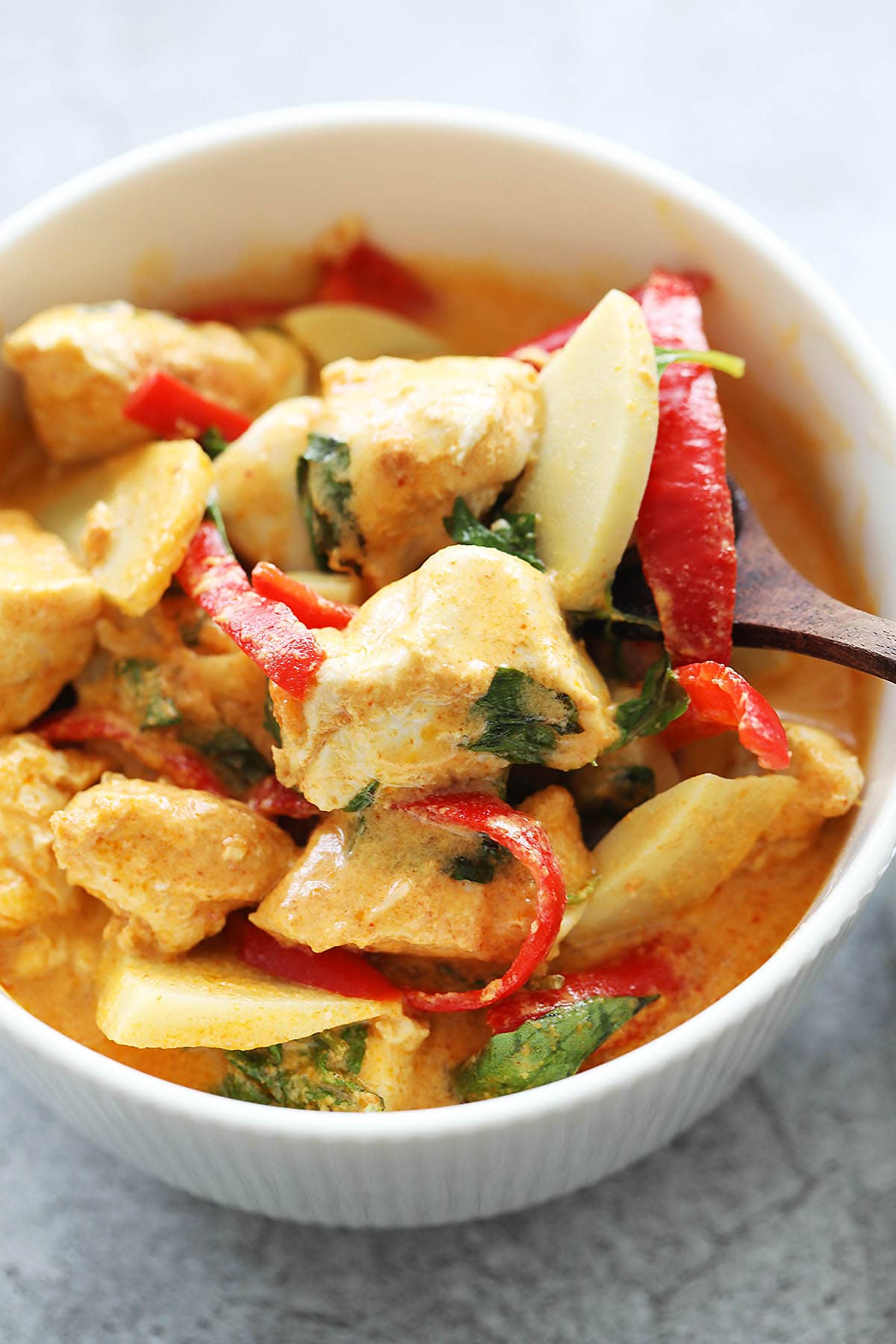
If you’re diving into Thai curries, you’ll find that Red Curry and Green Curry are totally different. Red curry has a rich, slightly sweet flavor thanks to the red chilies and spices in the paste. It’s usually a bit milder in terms of heat and goes really well with veggies like bamboo shoots, bell peppers, or Thai eggplants.
Green curry, on the other hand, is spicier due to the green chilies and has a fresh, herbal kick from ingredients like Thai basil. Its vibrant green color comes from the green curry paste, and it often includes veggies like Thai eggplants and baby corn. Both curries are fantastic, but each brings its own unique flavor and heat to the table!
How To Make Red Curry
Making chicken red curry is a breeze. With just 4 easy steps and 20 minutes, you’ll have a delicious dinner ready in no time.
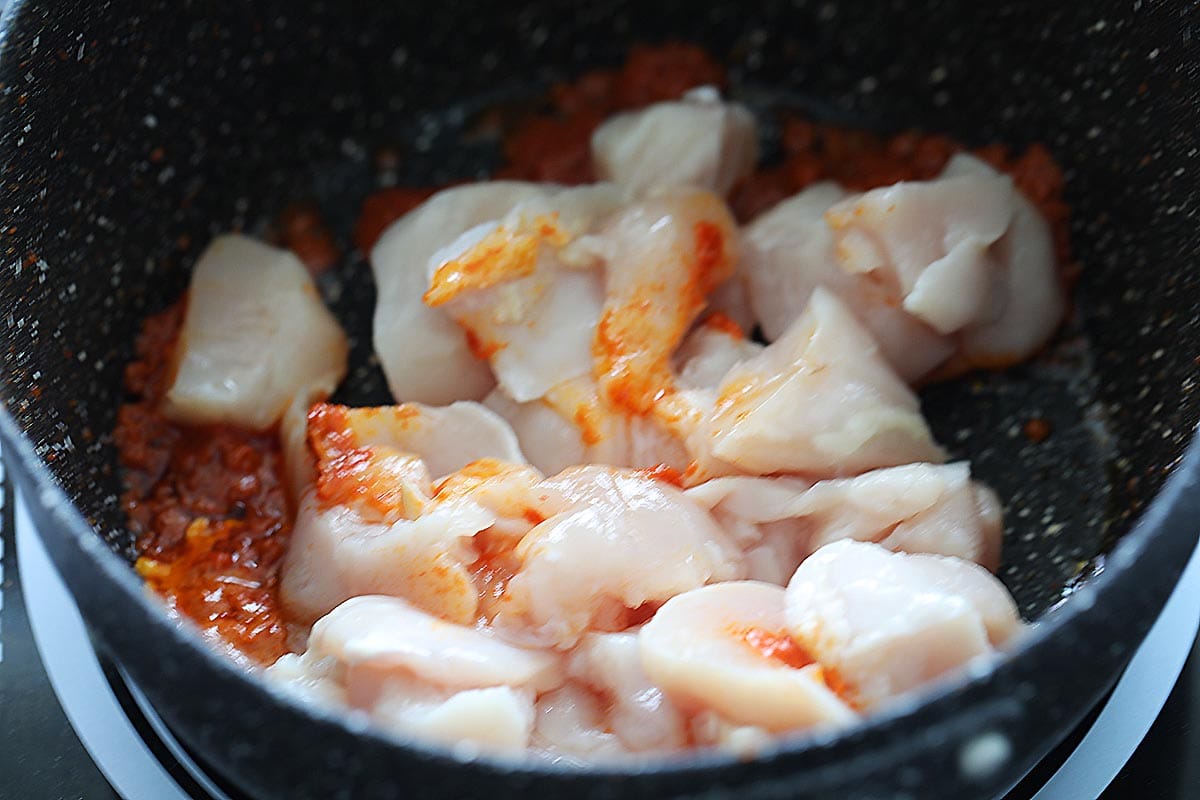
Step 1: Heat a small pot with the cooking oil. Sauté the red curry paste until aromatic. Add the chicken to the pot and stir well with the curry paste.
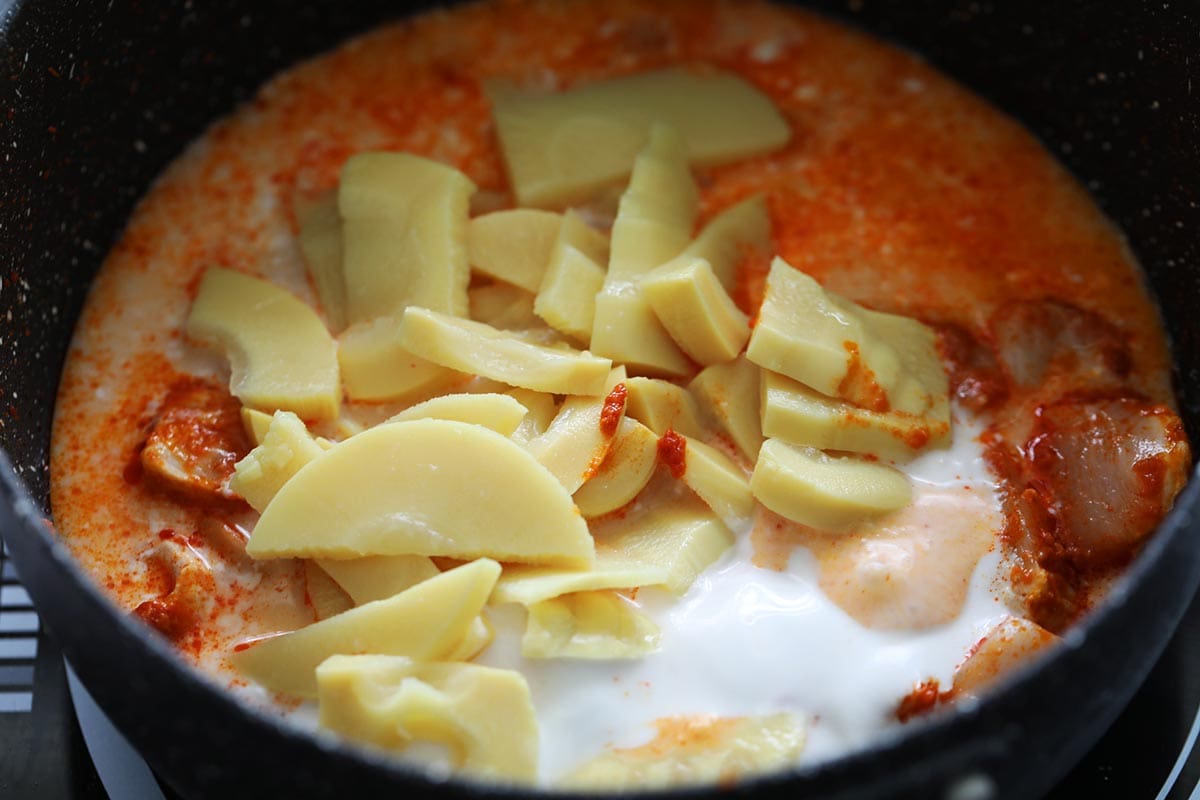
Step 2: Lower the heat, then add the coconut milk, water, and bamboo shoots. Bring the curry to a boil.
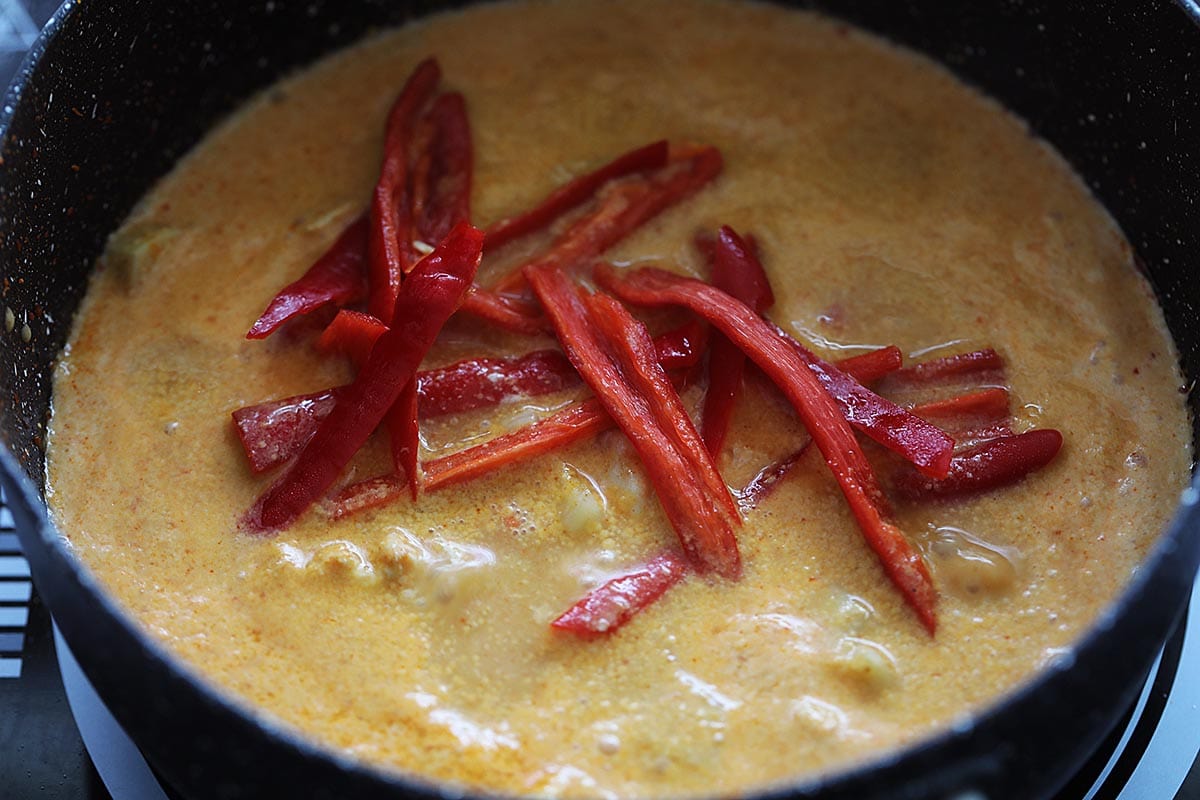
Step 3: Add the red chilies, stir to combine well.
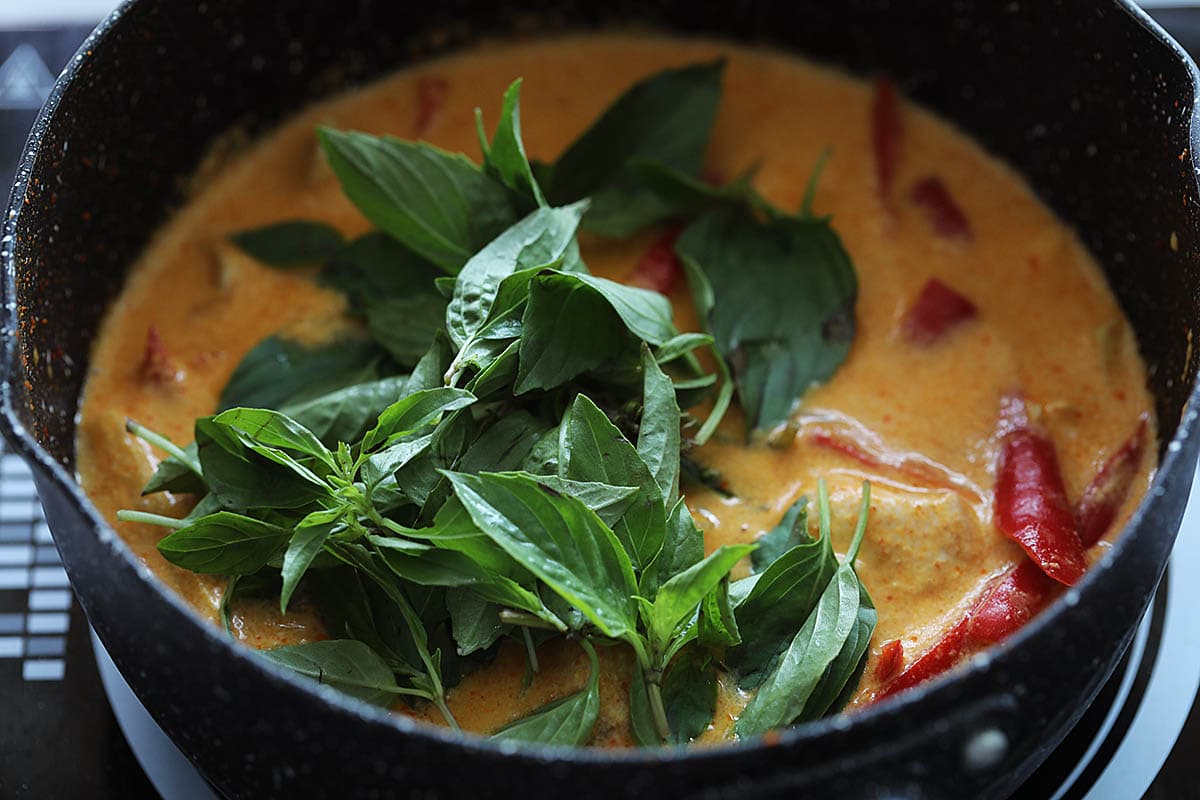
Step 4: Add the fish sauce and sugar, then stir continuously for about 10 seconds. Turn off the heat, add the basil leaves, and stir to combine.
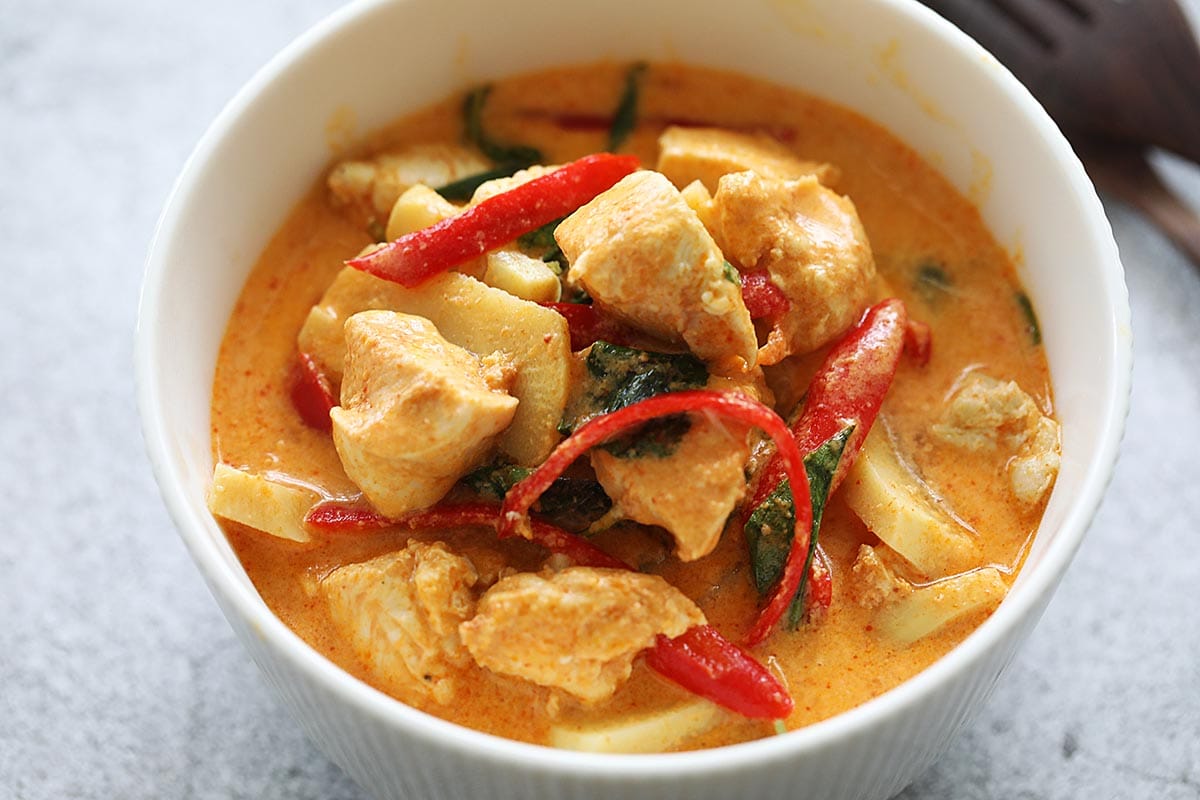
Step 5: Dish out and serve immediately with steamed jasmine rice.
Cooking Tips For Authentic Red Curry
To make a rich, creamy, and authentic red curry, use the following ingredients:
- Thai Palm Sugar: Ideally, use Thai palm sugar to sweeten the curry; if unavailable, substitute with regular white or brown sugar.
- High-Quality Red Curry Paste: I recommend Maesri brand red curry paste in a small can, available on Amazon. It’s convenient for storage and allows you to cook red curry multiple times without wastage.
- Coconut Cream: Opt for high-quality coconut cream for extra richness and to prevent curdling. Stir gently while cooking to maintain a smooth texture; I recommend Kara brand coconut cream. If you use coconut milk, reduce the amount of water in the recipe to avoid a soupy curry, and keep the heat low to prevent curdling.
- Fish Sauce: Essential for the authentic flavor; avoid using soy sauce.
Frequently Asked Questions
Yes, you can make Thai red curry vegan or vegetarian by using tofu and/or vegetables in place of meat, and substituting fish sauce with salt or a vegan alternative. For a vegan version, please make sure you use coconut milk without added animal products.
Yes, you can make red curry with fish. Just add pieces of firm white fish, such as cod, basa, or tilapia, and cook until tender. To ensure the fish is well-coated, you might reduce the curry sauce to a thicker consistency.
Yes, you can. Simply combine the curry paste, coconut milk, vegetables, and chicken in a slow cooker, and cook on low for 4 hours or on high for 2 hours until everything is tender. Add the red chilies and Thai basil just before serving to maintain their flavor and texture.
Curry is not a type of soup, though it can sometimes have a soupy consistency. It’s a dish made with a rich, spiced sauce or gravy, served with ingredients like meat and vegetables. Unlike soup, curry typically has a thicker, creamier consistency.
Coconut milk is traditionally used in Thai curries, but you can substitute it with alternatives like almond milk or cashew cream. Keep in mind that these substitutes will alter the flavor and texture of the curry.
This recipe is only 186 calories per serving.
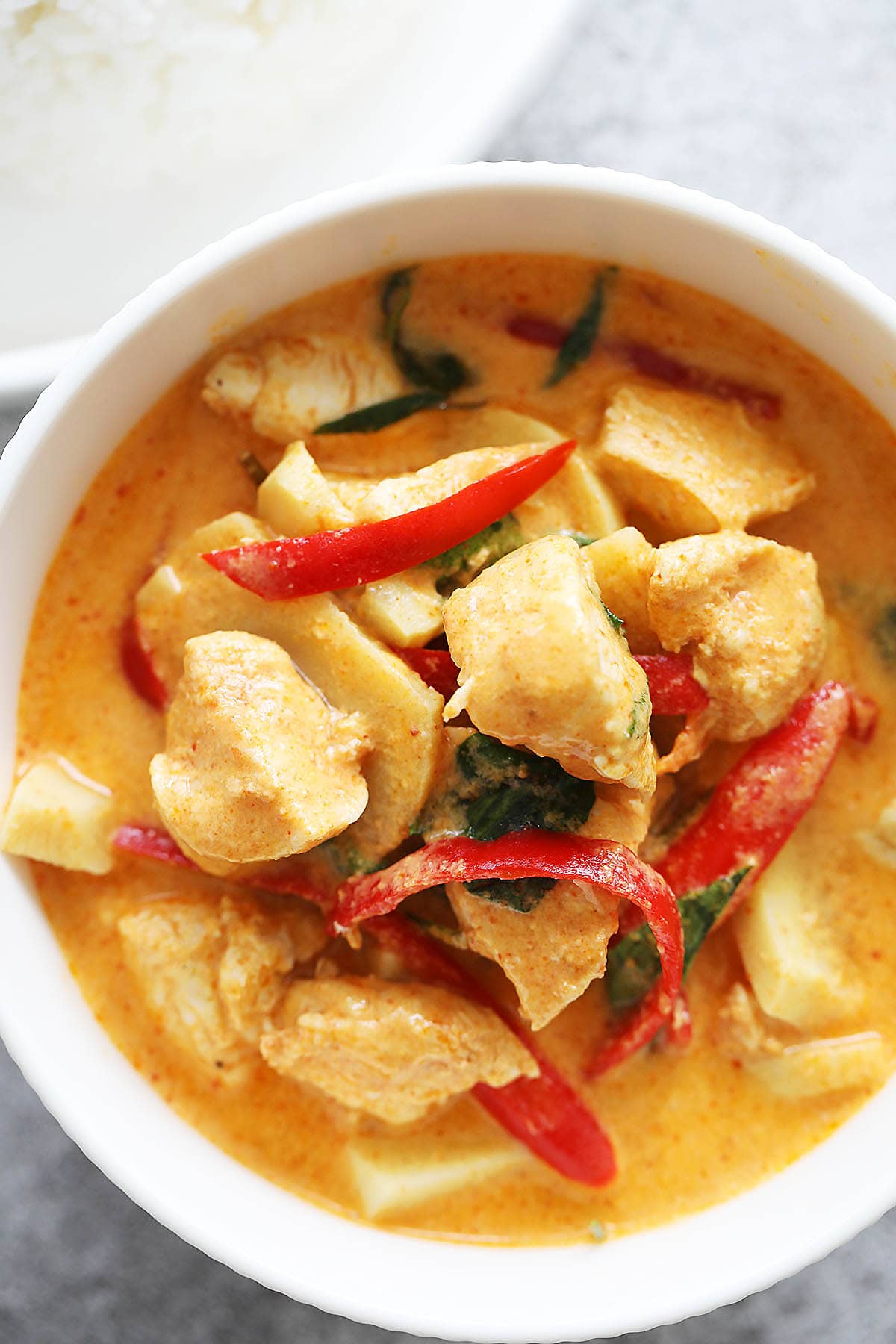
What To Serve With Thai Red Curry
Thai red curry is best served with steamed jasmine rice, which complements its rich, creamy sauce perfectly. For a wholesome Thai meal at home, I recommend the following recipes.
I hope you enjoy this post as much as I do. If you try my recipe, please leave a comment and consider giving it a 5-star rating. For more easy and delicious recipes, explore my Recipe Index, and stay updated by subscribing to my newsletter and following me on Facebook, Pinterest, and Instagram for new updates.
Other Recipes You Might Like
If you love curries, you will love these Asian curry recipes, each with its own unique taste and distinct flavors:
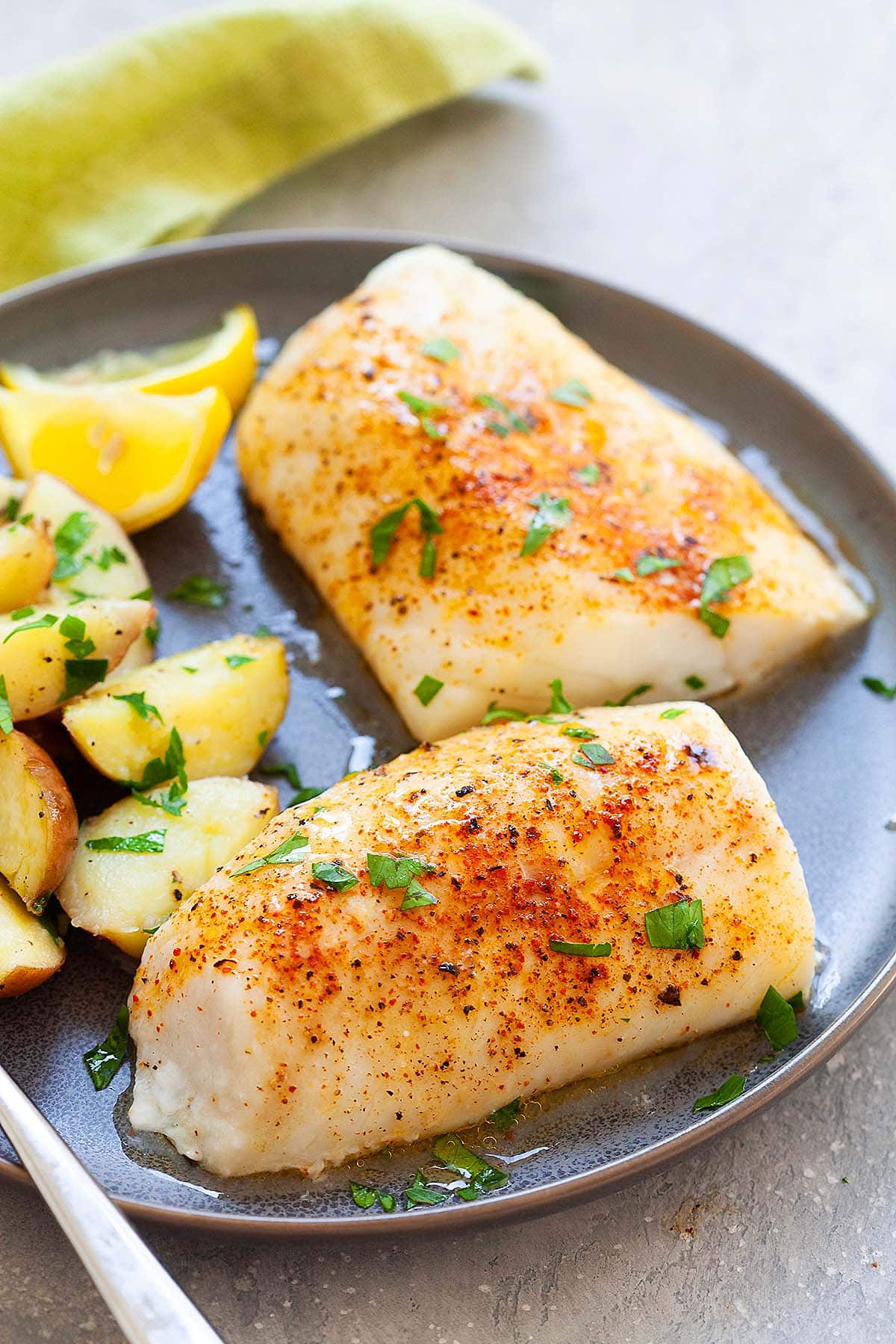
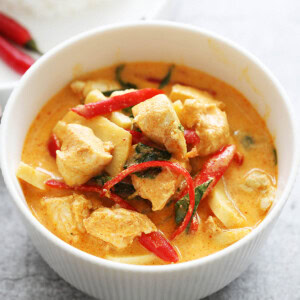
Thai Red Curry
Ingredients
- 1 tablespoon oil
- 1 1/2 tablespoons red curry paste, Maesri or Mae Ploy brand preferred
- 8 oz (250g) boneless and skinless chicken breast, cut into cubes
- 80 ml. (1/3 cup) coconut cream
- 3/4 cup water
- 1/2 cup sliced bamboo shoots
- 1-2 Thai chilies , or bird's eye chilies, lightly pounded, optional
- 1 red chili, cut into strip
- 1/4 cup Thai basil leaves, packed, stems removed
- 1/2 tablespoon fish sauce, or more to taste
- 1 tablespoon sugar , or Thai palm sugar
Instructions
- Heat a small pot with the cooking oil. Sauté the red curry paste until aromatic. Add the chicken to the pot and stir well to coat it with the curry paste.
- Lower the heat, then add the coconut milk, water, and bamboo shoots. Bring the curry to a boil.
- Add the red chilies and stir to combine well.
- Add the fish sauce and sugar, then stir continuously for about 10 seconds. Turn off the heat, add the basil leaves, and stir to combine. Dish out and serve immediately with steamed jasmine rice.
Video
Notes
- Coconut Milk: If you use coconut milk, cut down the water to 1/2 cup. Opt for good quality coconut milk, with a preference for coconut cream for extra richness. I recommend Kara brand coconut cream.
- Thai Palm Sugar: Ideally, use Thai palm sugar to sweeten the curry; if unavailable, substitute with regular white or brown sugar.
- Fish Sauce: Essential for the authentic flavor; avoid using soy sauce.
- High-Quality Red Curry Paste: I recommend Maesri brand red curry paste in a small can, available on Amazon. It’s convenient for storage and allows you to cook red curry multiple times without wastage.
Nutrition
Nutrition information is automatically calculated, so should only be used as an approximation.
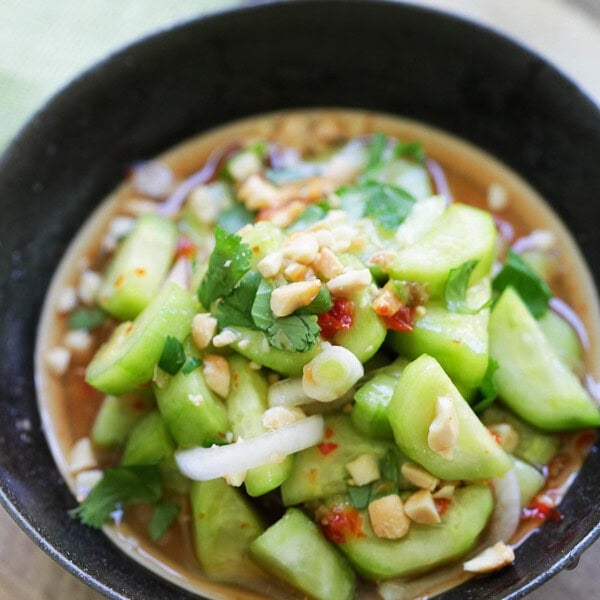
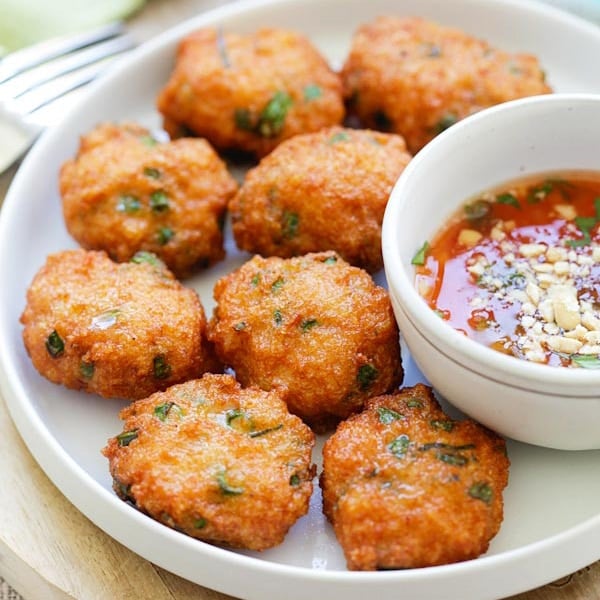
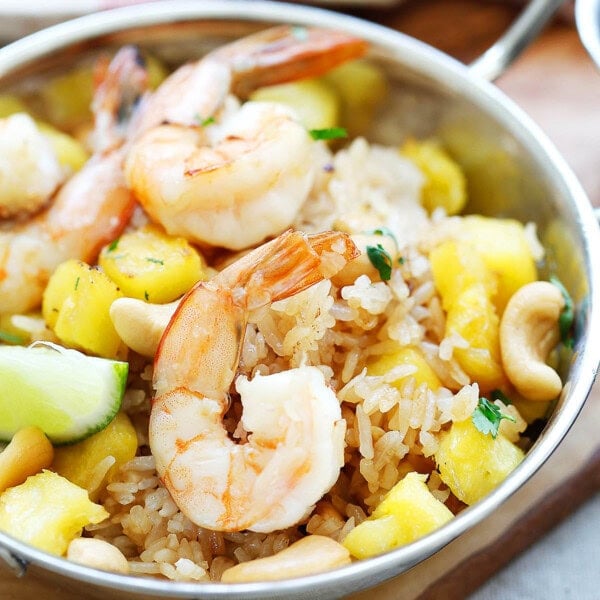
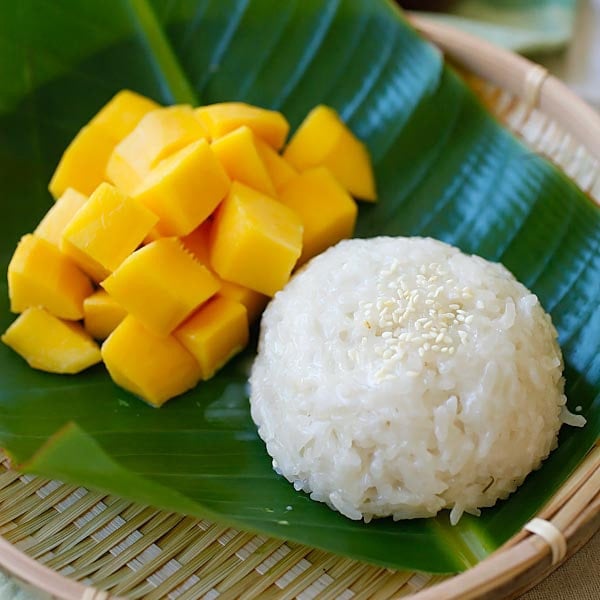






I never review recipes but this is by far the most yummy curry for how simple it is. I have made tons of curries at home and this one is my new favourite.
I never review recipes but this is by far the most yummy curry for how simple it is. I have made tons of curries at home and this one is my new favourite.
Very good recipe, though I have to admit seeing about 4/30 posts that commented after making this dish I was a bit skeptical. N Made some adjustments for scaling up to 6-7 servings, and wow was that good!
Bring to a boil then stir for an additional 10 seconds? Surely that is not long enough to cook the carrots, not to mention the chicken?
Btw, I used 900 ml coconut milk for my 6x and no water, so I think you could easily double the coconut milk.
I used jhl red curry paste and rounded the tablespoons. Made a 6x batch with only chicken. Next time I would smash the lime leaf and remove after cooking as they were tough. I used mushrooms-none of the other veg and added snow peapod last minute or two of cooktime. I also added 6 sliced Thai chiles sans seeds for some kick. I really enjoyed the dish and it was very tolerant of my tendency to overcook chicken-save the lime leaf. Thank you very much.